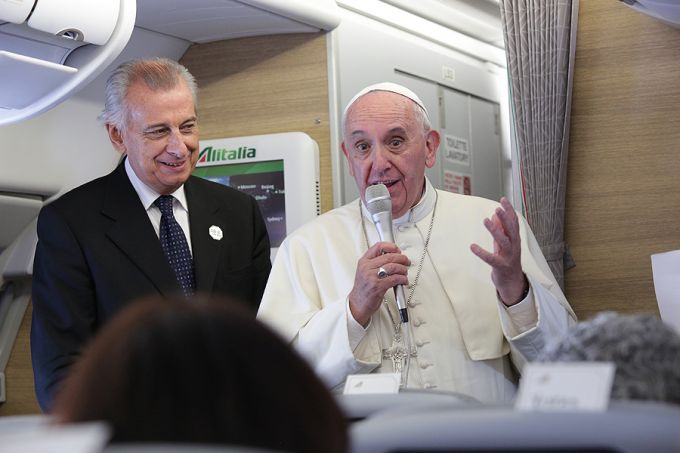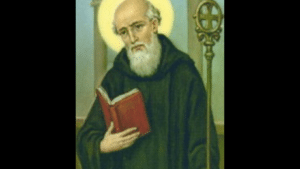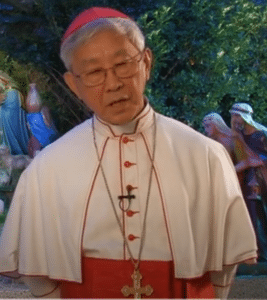12 Ways For a Catholic to Not Freak Out Every Time Pope Francis Speaks
Today, I had the pleasure of hearing a wonderful homily from Rev Peter M.J. Stravinskas, which was so amazing, I asked him if I could share it.
To be clear, the title of this post is mine, not the dear homilist’s!
What I loved about the homily is that it clarified my general approach to the confusion created by Pope Francis’ pontificate. I try to stay balanced. Balance is key. If you go too far to the left, you end up being in denial and if you go too far to the right, you might end up leaving the faith.
If you have been feeling frustrated almost to the point of despair, by the Holy Father’s interviews, please take some time and read the homily below.
Homily preached by the Reverend Peter M. J. Stravinskas, Ph.D., S.T.D., on 3 July 2016, the external Solemnity of Saints Peter and Paul (Extraordinary Form), at the Church of the Holy Innocents, New York City.
“On this past Wednesday, the Church Universal (all 23 of her rites) and the Orthodox Churches as well celebrated the Solemnity of the Apostles Peter and Paul. This morning, we are observing its so-called “external” solemnity for the benefit of those who were not able to participate in the Sacred Liturgy on the feast proper. Naturally, our thoughts turn to Rome, referred to in the ancient hymn for Vespers as “O Felix Roma” (O Happy Rome) because her origins were consecrated by the blood of the martyrs Peter and Paul. Furthermore, Rome is the “apostolic see,” par excellence, what St. Ignatius of Antioch, the second-century Father of the Church, would call “the church that presides over all the churches in charity.” That notion then turns our attention to the occupant of that seat or chair, the Bishop of Rome.
We Catholics believe that the Bishop of Rome has unique authority and unique responsibilities conferred on Peter and passed on to all his successors down the centuries. We know the scriptural basis of these claims very well. In Matthew 16, Jesus accepts with gladness Simon’s acknowledgment of Him as Messiah and Son of God and declares that this understanding of Simon’s is not of human origin but from divine revelation, with the result that Jesus renames Simon, making him the Kepha/Petra/Rock on which He would build His Church. Luke 22 records Christ’s directive that Peter “strengthen” his brethren in the faith – once he recuperates from his own failure in courage and fidelity. John 21 likewise contains a painful reminder to Peter of his triple denial of his Lord, undone by his threefold affirmation of love, thus causing the Risen Christ to commission Simon Peter as the “substitute shepherd” of His flock. Confirmation of the Church in faith and promoting ecclesial unity are the primary tasks of the Bishop of Rome. No pope in history has ever fulfilled these tasks perfectly – for no human being is perfect. Some came very close to doing so, while others fell considerably short of the mark.
As I speak, I cannot help but notice the nervousness of not a few of you, so let’s acknowledge the elephant in the room by asking where Pope Francis fits into the scheme of things. Unlike many of his modern predecessors – and especially his two immediate predecessors, who were truly extraordinary – he is not particularly endowed with gifts of culture, languages and broad horizons; nor was his philosophical and theological training very profound. And as the humble man he wishes to be, he has said all this on many occasions. It would be dishonest not to admit that the clarity of the pontificates of John Paul II and Benedict XVI has a yielded to some very unfortunate confusion. I suspect that some of you are most uncomfortable in voicing such an observation; yet others may be very vocal in criticism. Permit me to try to offer a path through the Scylla and Charybdis of denial on the one hand and vitriol on the other – a dozen thoughts for life in the Church of today.
1) The via negativa: Pope Francis has not spoken heresy. The Code of Canon Law defines heresy as “the obstinate denial” of one or more truths of the Catholic Faith (canon 751). That has not happened. Lack of precision is regrettable, but it is not heretical.
2) It is not disloyal, let alone sinful, to question church authorities (including the Pope) on the performance of their solemn duties. Indeed, the Code of Canon Law is quite clear in asserting that the faithful may actually have an obligation to do so, that is, if they have both the necessary knowledge and good will (cf. canon 212.3). One need only think of someone like St. Paul who brags about confronting St. Peter (cf. Gal 2:11). Or, St. Catharine of Siena, who harassed the Pope of her day into compliance, yet never failed to address him as “my dear sweet Christ on earth.” Catharine’s Dominican brother, St. Thomas Aquinas, is quite pointed in this regard. Thus we find this line in his Summa Theologica: “There being an imminent danger for the faith, prelates must be questioned, even publicly, by their subjects.”1
3) Vatican I’s declaration of Petrine primacy and infallibility (and its reassertion in Vatican II’s Lumen Gentium) was a necessary doctrinal development in light of the intellectual and political climate of the day, saving the Church from both faithless academics and meddling civil authorities and, equally, from a thousand bishops functioning as mini-popes. We have only to look at the dismal situation of the Orthodox Churches and their flailing council, held hostage to extreme nationalism and petty power plays. That said, an unintended but real consequence of papal primacy has been a kind of deification of the person of the Pope, exemplified by William George Ward (the nineteenth-century English convert and writer), who declared that he wished to be able to read a new papal bull every day with his Times at breakfast! That mentality eventually caused Cardinal Newman to remind all of the primacy of conscience with his would-be dinner retort: “If I am obliged to bring religion into after-dinner toasts (which indeed does not seem quite the thing) I shall drink – to the Pope, if you please, – still, to Conscience first, and to the Pope afterwards.”
4) The Catechism of the Catholic Church (n. 85), citing Dei Verbum 10 makes clear that the Magisterium is not above the Word of God but its servant. That includes the Pope and, actually, in a preeminent way precisely as the servus servorum Dei. As William F. Buckley reminded his audience on “Firing Line” after Pope John Paul’s first pastoral visit to the States in 1979, the Pope is the most constricted man on the planet – all he can do is repeat what has been taught from time immemorial.
5) A corollary of our previous point follows: The Pope is a member of the Church before anything else, and he won’t be a Pope in eternity. As such, he lives under the same Gospel imperative as all of us. Hence, Pope Francis constantly reminds us: “I am a loyal son of the Church!” St. Augustine put it well when he asserted: “For you I am a bishop, with you, after all, I am a Christian. The first is the name of an office undertaken, the second a name of grace; that one means danger, this one salvation.”
6) We must disabuse ourselves of the idea that the election of every Pope is the work of the Holy Spirit and the direct will of God. If that were the case, we would be hard-pressed to explain the Borgias. No, the whole Church prays that the Holy Spirit guide the College of Cardinals in their choice, but there is no guarantee that the cardinals will respond appropriately. In this regard, I would venture to say that the present pontificate might be a gift of the Holy Spirit to cause a correction to an unhealthy and unbridled ultramontanism that prevailed in many quarters as the “papolatry” I mentioned earlier. Psalm 146 cautions us: “Put not your trust in princes”; our ultimate trust is in Christ, not in his at-times very human vicars.
7) Not a few serious Catholics over the past three decades, when quizzed as to why they did or did not do something, had fallen into the trap of “sealing the deal” by saying that they did so “because the Holy Father does it” (or doesn’t). That is a very weak rationale. I don’t engage in a particular practice because the Pope does it; I do it because it is the right thing to do. It is wonderful if the Pope also does it, but it is not essential. In fact, Our Lord gave some very salient counsel on this score in regard to the religious leaders of His day (Mt 23:3): “Do whatever they tell you, but don’t follow their example!”
8) Catholics don’t have to like every Pope, but the lack of fondness ought never descend into carping or, worse, hatred. However, we must love him, above all, willing his eternal salvation. One’s love for one’s natural father does not blind one to his inadequacies or failures, nor does it demand silence in the face of problems. That said, never allow disappointment to diminish your own faith, hope and charity. At all costs, avoid extremism and progressive polemic. Remember: Luther started out condemning genuine abuses in the Church but ended up denying doctrines of faith. In our own day, we have seen how the Society of St. Pius X had its spin-off into that of Pius V. What’s next, Pius the Two and a Half? Cardinal Newman came to a position of intense dislike of Pius IX, even referring to the pontificate at its end as “the climax of tyranny,” encouraging his closest friends to pray for an end of the reign; however, he never doubted the divine institution of the papacy. And a caveat from St. Francis de Sales: “While those who give scandal are guilty of the spiritual equivalent of murder, those who take scandal – who allow scandals to destroy faith – are guilty of spiritual suicide.”
9) Don’t look for trouble. Some “uber” Catholics have made a cottage industry of trying to find missteps of Francis and even succumbing to acceptance of made-up ones. St. Ignatius Loyola teaches us always to seek to place the most benign interpretation possible on a superior’s teaching or directive. That helps ensure honesty and good will on our part; it also makes any legitimate criticism we make all the more credible.
10) Any displeasure or discomfort experienced with the present Pope might be an opportune occasion to repent of the ingratitude or grousing directed at his predecessors. I myself not infrequently bemoaned the weak governance styles of John Paul and Benedict – all the while admiring their razor-sharp intellects and direct, effective modes of communicating the truth. Every leader has assets and liabilities. God can punish us for highlighting the negative to the exclusion of the positive.
11) We have the duty to pray for the Pope’s growth in wisdom and holiness. Popes change. Pius IX morphed from being an open-minded individual to being quite reactionary, while Paul VI started out as rather given to change and ended up a stalwart proponent of Catholic doctrine, at great personal expense.
12) Never forget the Church is always in need of reform – Ecclesia semper reformanda. The Council of Trent boldly demanded the reform of the Church in her head and members. Many of us want a hierarchical Church of perfection, but fail to realize that the members of the hierarchy come from the ranks of the lay faithful. If you want a reformed and holier Church, you must commit to becoming a reformed and holier member yourself. As a matter of fact, there has never been an effective reform of the Church which was a top-down movement; it has always been from the bottom up.
Today, then, commit yourselves to a renewed faith in Christ, proclaimed by Peter as the Son of the Living God. Pray for Peter’s successor. And pray for your own spiritual peace. And keep emblazoned in your mind and heart: Christus vincit. Christus regnat. Christus imperat. Christus!”
Hey, are you on Facebook? Please join our nice little community on
Facebook: Beautysoancient.com.







With R Marx in Charge in Germany we might as well have Groucho or Karl Marx in Charge of dying German Catholics faith there. Ironic P Francis has noticed weekly church going there is like Canada and west Europe down to single digits, ,two perrcent in Belgium to nine percent in Germany and Canada etc. …………… I Cringe every time P. Francis opens his mouth in a airplane the Movie like interview. He and the others should Memorize the Baltimore Catechism.. Otherwise Retire before they have embarrassed themselves and the fading faith Rc, in the west any further than they have. Shame on Francis, Schonberg, van Kesel and R Marx etc. Etc..
I’m just surprised he doesn’t have speech writers or handlers – especially since it keeps happening over and over again.
This happens every time the Vicar of Christ, (whoever it may be at the time) opens his mouth to ask forgiveness because of past (members) sins. It doesn’t matter which group or groups are being focused on. This will occur until the end of time. His style does not state in a clarifying manner, thus, we have pundits interpreting. Personally, I am humbled to my knees each time the Vicar has asked for forgiveness from any group or groups. To be fair, he asked forgiveness for the way the poor, women and victims of war have been treated in the past as well. Repentance always comes before cleansing from Christ. Thanks be to God. PAX
I really, really wish I could feel so humbled. Instead I recoil in horror.
Thanks for posting this. Excellent teaching and advice.
I’ve gotten into some tiffs for “daring” to disagree or defend Pope Francis.
When I listen to or read something he said, I think in Spanish. English-speaking Americans tend to be pretty literal because our culture values rule of law, or has, and that law applies to everyone.
In Latin countries metaphor, description, exaggeration, and sentiment are much more common. It is a different way of communicating, but is very common and easily understood in the rest of the world.
I’d recommend this by an American priest who has lived in Latin America.
https://cruxnow.com/commentary/2016/07/02/pope-francis-goes-off-cuff-think-latin-america/
Thanks for that article!
You’re welcome!
Fr Stravinskas’ comments are well considered and appreciated. But here’s the problem I would ask him to reconsider. His comment #1 says that Francis has not spoken heresy. There are two forms of heresy: Formal (intentional) and Material (unintentional). We don’t know Francis’ mind so we cannot allege Formal Heresy. However, we can read his words and simply observe whether or not they oppose Scripture and Catechism. Three of Francis’ statements, confirmed by Vatican transcripts are: 1. There are many paths to God which can be traveled through many religions. 2. Artificial contraception for the prevention of pregnancy is not intrinsic evil. 3. Many cohabitations outside of formal marriage are nevertheless “real marriages.” Francis made these statements. The Vatican has issued transcripts confirming these statements. I am not saying that he intended to contradict Catholic teaching so must assume that his contradictions were unintentional. But regardless of his intent, he made the statements. So I would ask Fr. Stravinskas to reconsider his statement #1. Chip Field
Fr Stravinskas’ comments are well considered and appreciated. But here’s the problem I would ask him to reconsider. His comment #1 says that Francis has not spoken heresy. There are two forms of heresy: Formal (intentional) and Material (unintentional). We don’t know Francis’ mind so we cannot allege Formal Heresy. However, we can read his words and simply observe whether or not they oppose Scripture and Catechism. Three of Francis’ statements, confirmed by Vatican transcripts are: 1. There are many paths to God which can be traveled through many religions. 2. Artificial contraception for the prevention of pregnancy is not intrinsic evil. 3. Many cohabitations outside of formal marriage are nevertheless “real marriages.” Francis made these statements. The Vatican has issued transcripts confirming these statements. I am not saying that he intended to contradict Catholic teaching so must assume that his contradictions were unintentional. But regardless of his intent, he made the statements. So I would ask Fr. Stravinskas to reconsider his statement #1. Chip Field
Chip, I was thinking the exact same thing.
Thank you for this wise advice. I’ve been trying something similar but I’m finding myself short of the heroic virtue necessary for practice.
That being said, I agree with Chip. I would add that the Holy Father’s statements while addressing the hysteria of “Zika” when he told the faithful that women may use contraception when there is a chance they could conceive an imperfect child.
Additionally, the Holy Father has gathered some of the most notorious heretics in the episcopal see and positioned them to speak theology on the family on his behalf. It is impossible not to hold him accountable for the content.
Prayer and fasting can get lost in all of this and I’m always grateful for the reminders.
The vespers hymn is “O Roma Felix.” It’s the Pontifical Anthem that uses “O Felix Roma.”
Okay. Tell that to Father! 🙂
Comparing the SSPX to Luther is divisive, unformed and just silly in this day and age in the Church. We have a Pope who is leading countless souls in the wrong direction, and you focus on detraction toward good Catholic faithful and priests. Very unimpressed.
Saw a link to this article on another website and glad I followed it. As a relatively recent convert, I have found many of Francis’ remarks (and reported remarks) to be confusing or concerning. I have found it helpful to remember that his worldview as an Argentinian is likely different from a European one. And that the media at large will prune his comments to fit whatever narrative is to be pushed. And that the Church has had some very mediocre and some downright bad Popes. It helps to dip into church history. Meantime my job isn’t to seek union with the Pope but with Christ.
I agree that his Argentinian upbringing colors the way he sees things, unfortunately.